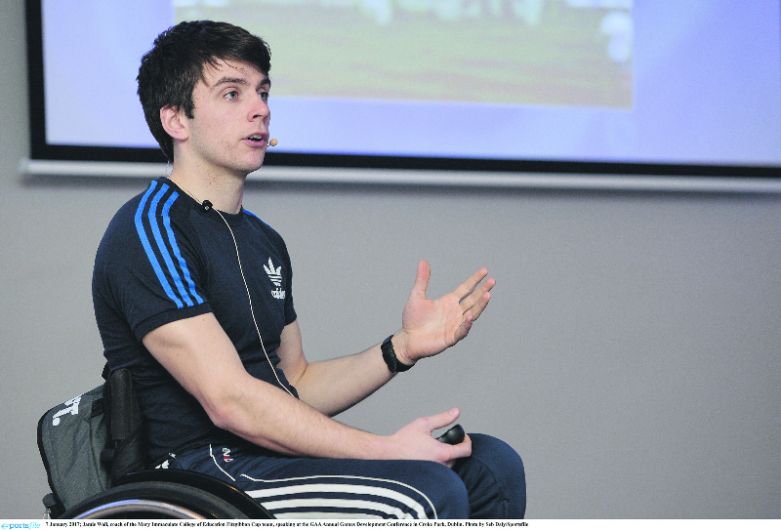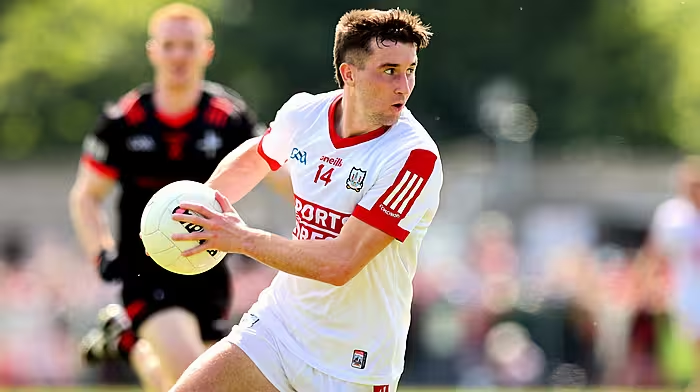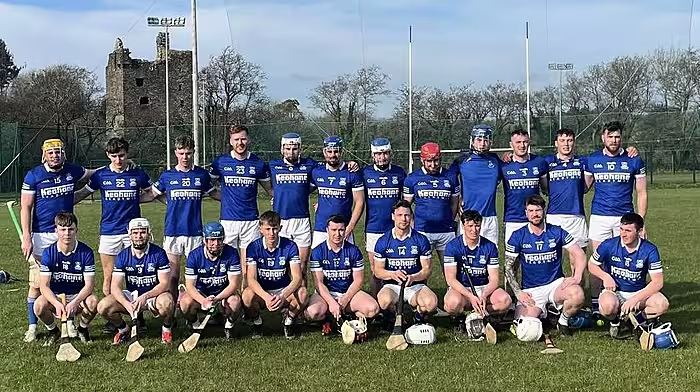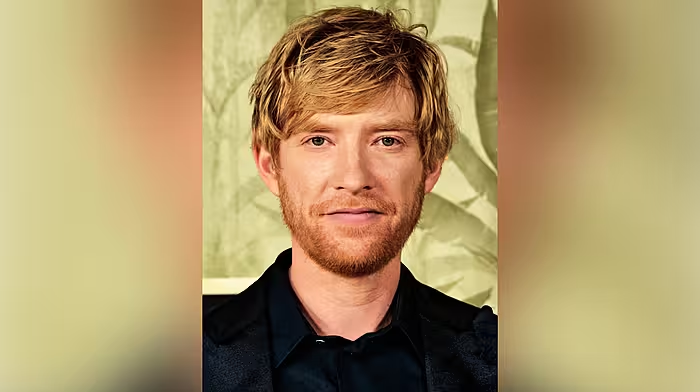Feature interview with Kilbrittain's Jamie Wall, manager of Mary Immaculate College’s Fitzgibbon Cup team
Jamie Wall is not like any ordinary 24-year-old. For a start he is the new manager of Mary Immaculate College’s Fitzgibbon Cup team, a challenge the Kilbrittain man is relishing – but what sort of manager will Jamie be? We spoke to the man himself to find out
*****************
AS expected, the Fitzgibbon Cup holders, Mary Immaculate College, began the defence of their maiden title with an easy 2-31 to 0-16 victory over GMIT on Tuesday afternoon.
Why the interest in the Limerick institution? Well, this year their fortunes are guided by Kilbrittain’s Jamie Wall, making his first foray into management at the age of 24.
He doesn’t go in as a complete green-horn, it must be said: last year, he was a selector as his alma mater won the intervarsity competition under Eamonn Cregan.
To set a frame of reference, we open with a question asking if the Manchester United fan is entering similar territory to David Moyes when he replaced Sir Alex Ferguson at Old Trafford in 2013. He has an appropriate story.
‘You’re going to start the interview with David Moyes, wow!’ he laughs.
‘I went over to Brentford to see John Egan playing when I was in England last year, and I met the man himself. This was only a week or two after getting the (Mary I) job and nothing dawned on me until I was driving back from West London up to Cambridge.
‘I was stuck in traffic and I had the phone on the loudspeaker in the car and I was on the phone to (girlfriend) Louise, she was asking how I got on and I said, “Grand, I met David Moyes actually.”
‘She didn’t know who that was and I said, “He took over Manchester United after Alex Ferguson,” so she asked if he was still the manager and it was when I said, “No, he got sacked,” that it sunk in with me, I’m after taking over from Eamonn after winning the Fitzgibbon.’
It’s not the path he would have expected to take three years ago, when he played his last Fitzgibbon game for Mary I. He had played minor and U21 hurling and football for Cork and was on the extended county senior hurling panel when, that summer, a spinal abscess left him paralysed from the waist down. The quest to change that situation remains ongoing, but he has also tackled new challenges.
He enjoyed his year as a selector – ‘It was like the analogy of the big wheel – the lads got it rolling and all you have to do at that stage is give it a little tap’ – and when Cregan stepped down, the notion of Jamie taking over was suggested by more than a few others.
‘I was going to England for a couple of months and I was on my own for a while there,’ he says, ‘I was coming home for the lads’ medal ceremony in April and again a few of us were chatting, wondering what was going to happen.
‘I’d have said it to one or two of the senior players and asked what they were thinking. They seemed like they’d be happy with it, so I had a good think about it when I went back to England and I said, “Do you know what, I’m going to have a cut off getting it anyway and if I don’t, what about it? I’m going to go for this because I reckon that if I get it I’m going to do it well and I’d rather I’m trying to do it well than someone telling me in six months’ time that things have gone to hell in a handcart”.
‘I’m not saying that I’ve all the answers, but I emailed (Mary I sports officer) Ciara Cregan and said I’d ask rather than hearing in July that someone else was taking over and being left regretting it, so we arranged to meet for a chat when I was home for two weeks in June.
‘Being on my own in Cambridge, I sat down for a few evenings and ended up with half an A4 pad full of a shell of a proposal or resumé. I put that together, printed two or three of them and bound them and went in for my interview. I said, “This is what I want to do slightly differently, this is what I want to do the same, here’s how I’m going to do the job if ye give it to me, the ball’s in your court”.
‘I got the call when I was coming back from France for the Euro 2016 last-16 game in Lyon offering me the job if I was still interested, so in the last two months in Cambridge I started planning for September.’
***************
In 2013, Jamie was part of the Mary I which reached the final, alongside Luke O’Farrell, Limerick’s Declan Hannon – the matchwinner in last year’s decider – and John Conlon of Clare, among others.
They fell short in ’13, losing to UCC, but it sowed a seed.
‘The 2013 team had a huge influence in the 2016 win, in a number of ways,’ Jamie says.
‘The first was obviously just that we had come so far and the novelty factor was gone. The other side of it too was that, when I was in Leaving Cert in the Hammies (Hamilton High School in Bandon) and deciding where to go to college, a huge part of my decision – and no point saying it wasn’t – was, “Do I want to go to Mary I and be a teacher or do I want to play Fitzgibbon and Sigerson with UCC or UL or whoever?”
‘There was a part of thinking I wouldn’t get any hop if I wasn’t playing Fitzgibbon, because it has become such a factor. All of a sudden then, us getting to the final in 2013, you had a lot of fellas in Limerick, and Tipperary and Clare, who might have been planning on going to UCC or UL, they were thinking, “I can do arts or teaching in Mary I and play Fitzgibbon too”.
‘The result was that, when I was in third year, they had an unbelievable freshers team, Ronan Maher, Stephen Cahill, Tadhg Gallagher, Richie English, Darragh O’Donovan. They lost the All-Ireland final to UCC, which was a huge thing as the freshers – especially when you’ve just one year to choose from – is nearly always going to be dominated by the bigger colleges.
‘It’s no surprise then that freshers team backboned the team that won the Fitzgibbon last year.’
Another contributory factor was the dominant course in Mary I – primary teaching – was extended from three to four years. As a result, the panel could now be drawn from a wider group.
‘Last year was the first that there were four years together in the college on the primary course,’ Jamie says..
‘When we only had a three-year course, I felt that it was an injustice. We only have two courses to pick from, realistically, as we’re not drawing anyone from early childhood studies, and up until last year we only had two years to choose from because freshers couldn’t play.
‘I understand that rule in colleges where it’s four years as they wouldn’t need them and they wouldn’t be picked anyway. If you went back to our team that got to the 2013 final, if we were allowed freshers we’d have had Séamus Kennedy, John Maher, David Reidy and that would have made a huge difference.’
****************
As well as the Fitzgibbon team, Jamie is in charge of the freshers. It means a heavy workload but it makes for an integrated approach.
‘You look at your fresher team with a more long-term view,’ he says.
‘It’s something that I maybe harped on about on Twitter a few months ago about Cork GAA and that short-termism that we get.
‘Because I’ve the Fitz and the freshers, I’m looking at the freshers as a development squad at times, it’s not the be-all and the end-all here, you’re able to look at the player as a person rather than, “What use is he to me right now?”, which is the trap that maybe we have fallen into.
‘Being in charge of both of them this year has meant that we have them playing a similar way to each other in terms of the way we want them to play, so next year you’re falling into that way. I’m not saying it’s the right way or the wrong way or that there’s only one way to play, it’s not even the way to play but just the principles, “These are the three or four things that we always want to do when we’re on the field”, simple things really.
‘It’s not like I’ve reinvented the wheel, it just allows that overall development. It’s not like a director of hurling role or anything, but you do get that bit more opportunity for more oversight and longer-term thinking.
‘If you have a guy in first year who picks up a knock that mightn’t be overly serious but will keep him out for four-to-six weeks, you’re looking at him saying that it’s not worth ruining four or five months of his hurling here and it’s going to have negative effects, let’s just put him first rather than just trying to win this game.
‘That’s something for the freshers and the Fitz, one of the few things that I’m confident that I am doing right is dealing with players, managing them and putting them and their careers first rather than purely just milking them as much as you can and then kicking them off down the road.’
He has been the player pulled from pillar to post with many masters to answer, so can appreciate it from the other side. He is also keen to impart advice to aid improvement, having benefited from the same.
‘I always say that the best managing I ever got was after I was taken off at half-time against Armagh in the All-Ireland minor quarter-final in 2010,’ he says.
‘A week later, Brian Cuthbert met me in CIT an hour before training for a chat about what had gone wrong, and what I could do to rectify it for Galway in the semi-final. I got the nod for that and it was definitely my best day out with Cork. That wouldn’t have come if I didn’t have a manager who had enough interest to say, “This is why you were taken off at half-time, bang,bang, bang”. It’s not a nice conversation to have, you see, that’s why it’s avoided a lot of the time.’
****************
Jamie sees his management style as being a composite of the best parts of what he has experienced, all the way to underage level with the late Kieran O’Driscoll in Kilbrittain.
‘If you want to talk about someone having a holistic approach, Kieran was all about the person,’ he says.
‘He just wanted lads to be happy playing hurling and whatever your level was, Kieran catered for that. I remember we might be going to the All-Ireland and Kieran would be up with C103 and he’d be chatting to Dad on the phone and I’d be put on to him for a few minutes and he’d say to watch Ben O’Connor because “you solo the ball very like him”. I don’t know if I did or I didn’t, but I was walking on sunshine for the weekend.
‘He told me when I was 14 that I’d play dual minor for Cork and it was March 2010 that he died and that was the year I got to play both codes. You ask anyone in the club, from fellas way older than me all the way down, for anyone lucky to work with him it was always about developing us as players than winning.
‘The clinical coaching then I would have got from Cubby and Cleary, that was huge. They were different in terms of their styles and I remember at the time they were both going for the senior job, people seemed to be in one camp or the other, I was just thankful we had this decision to make because they were both unbelievable managers.
‘One of them getting didn’t mean the other wasn’t a good manager. If I was asked who influenced me more, I’d say that it’s apples and oranges.’
Whatever happens, he’ll be learning.
‘I want to be open to doing something wrong, because if you’re open to it, it means that if you do something wrong, you can correct it,’ he says.
‘If you in your own have decided that there’s no way you’re wrong, you leave no opportunity for growth or development. You have to be unafraid to make a mistake and then unafraid to admit you made it – “Fine, I made a mistake, I’ll move on and make more mistakes and learn from them”.
‘We played Carlow in the league and I was talking to Mick Dempsey, who has been involved with Kilkenny. He asked how I was getting on and said that I was enjoying it, I was learning. I said I reckoned, “The only thing I’m sure of is that the day you stop learning something…,” and he finished my sentence and said, “…you’re finished”.
‘I often bring it back to teaching because that’s why my degree is in, I say that teaching is teaching but content is variable.’
And the long-term path? He is honest enough to admit that he considered all possibilities but isn’t tying himself to any particular one.
‘I don’t know, is the genuine answer,’ he says.
‘When I was player, I had a trajectory in my head and if I wasn’t on it I’d be beating myself up, “Why am I not on that panel?”.
‘There’s a clock as well, I was thinking that if I didn’t make it by 24 or 25, I might as well go to Dubai and teach or travel. With the management and the coaching, there’s obviously a lot longer shelf-life, you could do it until you were 70.
‘There’s no urgency but at the same time I’m only in my first year, I’m doing it and I’m enjoying it but I haven’t looked beyond it.
‘Would I like to be the Cork manager in 20 years’ time in Croke Park? Maybe I would be, but maybe I’ll be there in a couple of years saying, “F**k that, I never want to coach a team again”.’









